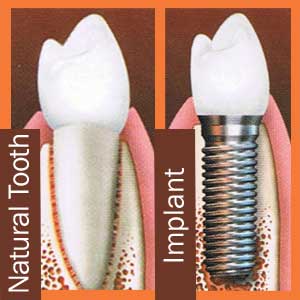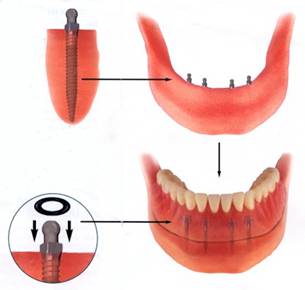If you’ve lost teeth to damage or decay, you may be considering dentures. However, there are some alternatives that you may not be aware of. Let’s take a look at several alternatives to dentures, and compare them to traditional dentures.
3 Alternatives to Dentures You Need to Know About
Some of these alternatives to dentures might be ideal for some patients, but they might not work for others. Different types of false or prosthetic teeth are made for different situations. As we take a look at different alternatives to dentures, we’ll consider pros and cons of each, and explore which situations they’ll work best in. Keep in mind that these are only general guidelines. Discuss these alternatives with your dentist or orthodontist to get a better idea of what solutions will be best for you.
1. Dental Implants
Dental implants can be a great alternative to dentures if you’re missing a few teeth in different parts of your mouth. This process can be long, but it will give you the best fit and the most reliable, comfortable solution long-term.
Dental implants mimic your real teeth, and they connect directly to your jawbone. This is a surgical procedure that requires a few steps. First, you’ll need a consultation to determine if dental implants are right for you. If these are a good solution for you, you can schedule a procedure to first place the abutment. This metal piece acts as the dental implant’s tooth root. It is surgically placed into your jawbone, and the artificial tooth is placed on top of the abutment in a separate procedure.
The dental implant’s connection to the jaw bone helps to prevent the jaw bone from deteriorating, which can occur with traditional dentures. Since traditional dentures are not attached to the jawbone, the jawbone will not have any regular pressure applied from chewing. Over a longer period of time, this disuse causes the jawbone to weaken and shrink, which can cause changes to facial structure as well. If you have bone loss, you can still get dental implants, but the procedure will have a few more steps. Depending on your situation, same-day implants that simplify the procedural steps may be an option.
2. Bridges
Dental bridges can be a great alternative to dentures if you have a group of teeth missing in the same part of your mouth. For example, if you are missing three teeth, all which are next to each other, in the upper, back part of your mouth, a bridge may be able to replace all of these teeth more easily than implants or dentures.
There are several different types of dental bridges. Some of these are permanent, and some of these are removable. Which is right for you will depend on the state of your teeth and jaw, your budget, and what you are most comfortable with.
Removable Bridges
A removable dental bridge is similar to traditional dentures in many ways, and can be a good alternative to dentures if you have healthy existing teeth near the missing or damaged teeth. A removable bridge fits over your existing teeth on either side to hold the prosthetic in place. The middle of the prosthetic uses two or three artificial teeth, which replace the missing teeth. It’s possible to use two or more removable bridges to replace missing teeth, as long as there are healthy teeth to hold the bridges in place.
Removable bridges must be removed at night when you sleep, and cleaned in ways that are similar to dentures. These types of bridges are not attached to the jaw bone, and the jawbone may deteriorate over time. Removable bridges, however, do not require surgery, and they can be a faster, more cost-effective alternative to implants and dentures, when you still have some remaining, healthy teeth.
Permanent Bridges
Permanent bridges, as the name implies, are not removable. These are similar to removable bridges in their appearance, but they are permanently affixed to your teeth. These types of bridges are typically secured across filed down healthy teeth on either side with dental cement. In cases where healthy teeth are not available for support, a dental implant can be placed to secure the bridge to and fix the teeth into place.
For many people, a permanent bridge is a more comfortable alternative to removable bridges. Permanent bridges are more similar to your real teeth, and they don’t need to be regularly removed or cleaned. You can brush them and chew with them just like your regular teeth.
3. All-on-X Implants
All-on-X implants are a relatively new alternative to dentures. This alternative may be ideal if most of your teeth are lost or damaged. All-on-four implants can provide complete coverage over your mouth, and they are permanent, unlike traditional dentures. Many people find these alternatives to dentures to be more comfortable and they involve less maintenance.
All-on-four dentures are similar to permanent dental bridges, except they cover the entire set of teeth (either top or bottom or both). The prosthetic teeth attach to strategically placed dental implants and hold them in place, permanently. These implants function just like your regular teeth; you can eat and talk as you normally would, and maintain them like natural teeth.
The procedure to install all-on-four dental implants is more involved than the procedure for traditional dentures. First, the dental implants must be surgically placed in your mouth. Then, the implants themselves must be designed before they can be attached to the dental implants. Since the dental implants that hold the larger implant in place are attached to the jawbone, your jawbone must be healthy enough to withstand the implants. If not, a bone graft can make this possible, but this adds another step in the process.
Traditional Dentures
Traditional dentures are, of course, another option to replace missing teeth. For traditional dentures to be effective, all of your teeth in your upper or lower jaw (or both) must be lost. If most of your teeth are missing, or your remaining teeth are not healthy enough to support bridges, denture may be effective for you.
To properly fit dentures, your remaining teeth must be removed. After your mouth has healed, your dentist will take a mold of your mouth and design properly-fitted dentures. These are removable, and they must be taken out at night, and placed in a glass to prevent them from drying out. They must also be cleaned regularly. Denture adhesive can help to keep your dentures in place.
Traditional dentures can be an affordable, and relatively simple option for many people. However, many people find dentures to be uncomfortable, especially long-term. Since dentures do not attach to your jawbone, your jawbone will start to weaken over time. This can cause changes in your facial structure. Over time, these changes may also cause your dentures to fit awkwardly, and you may need new dentures.
There are many alternatives to dentures to consider. If you are missing several teeth and you are wondering how to replace them, talk to your dentist. Tell your dentist about what you are comfortable with, what intervention you would prefer, and what your budget is. If you are concerned about the costs of dental care, look for an office that can help you manage costs with a payment plan. The dental or orthodontic offices at BDG provide low-cost payment plans, and our experts can help you find affordable, high-quality care. Make an appointment today to learn more.


